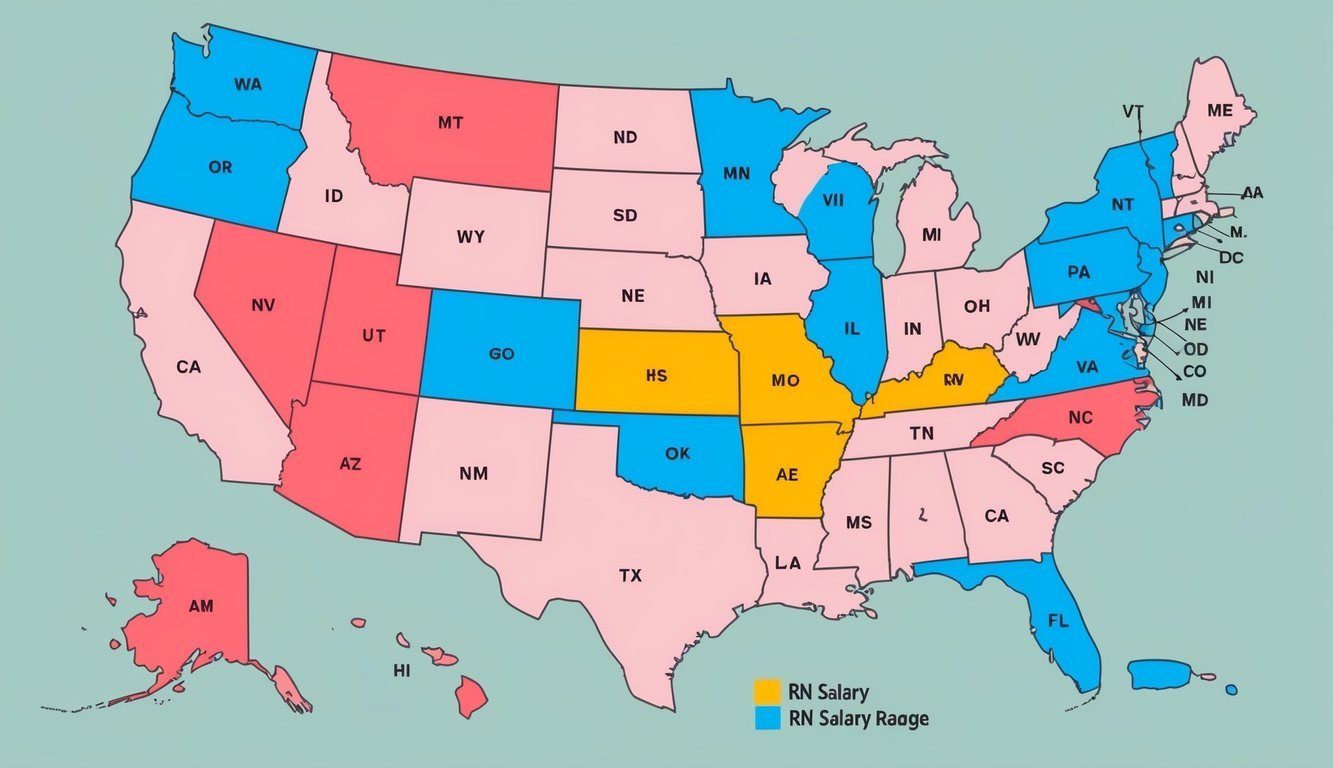Registered nurses play a crucial role in the healthcare system, impacting patient care and outcomes every day.
If you’re considering a career in nursing or looking to advance in the field, understanding the average RN salary can play a significant part in your decision-making process. The median annual salary for registered nurses is approximately $81,220, equating to about $39.05 per hour.
Salary expectations for registered nurses can vary widely based on several factors, including location, experience, and specialization.
For instance, states like California offer some of the highest salaries, averaging around $124,000 annually.
You can explore how geographical differences impact earnings by reviewing the highest paying states for registered nurses.
When considering advancing your career, understanding how education and certifications can boost your earning potential is essential.
The salary range for RNs typically spans from $61,250 to $129,400 annually, depending on various factors.
You can learn more about the specifics of RN salaries and ways to enhance your income through further education at RN Programs.
Understanding RN Salaries
Registered nurse salaries vary widely based on several factors.
By considering elements like experience, education, and location, you can better understand how these aspects influence your potential earnings as a registered nurse.
Factors Influencing RN Salary
Several key factors can impact the salary of registered nurses.
Experience is a significant contributor; RNs with more years in the field typically earn higher wages.
According to the U.S. Bureau of Labor Statistics, the highest 10% of RNs make approximately $132,680 annually, while the lowest 10% earn about $63,720.
Other influencing elements include specialization.
For instance, RNs working in critical care or surgical settings often receive higher compensation than those in primary care.
Additionally, the type of employer—hospitals, private practices, or public health departments—also affects salary ranges.
Role of Education in Nursing Salaries
Educational attainment plays a crucial role in determining your salary as a registered nurse.
As of recent data, the average annual RN salary is around $89,010.
Those with advanced degrees, such as a Master of Science in Nursing (MSN), typically command much higher salaries.
For example, certified nurse practitioners, who often hold a master’s degree, earn a median salary of approximately $128,490.
Pursuing further education such as certifications or specialization programs can enhance your earning potential significantly.
Geographical Variations in RN Salary
Location is a critical factor influencing RN salaries.
Certain states and cities offer higher average incomes due to demand, cost of living, and healthcare funding.
For instance, RNs in California, Hawaii, and Oregon report the highest salaries in the country.
Here’s how average salaries compare across select locations:
| State | Average RN Salary | Average Hourly Rate |
|---|---|---|
| California | $137,085 | $65.94 |
| Hawaii | $115,686 | $55.65 |
| Oregon | $99,265 | $47.71 |
| Puerto Rico | $36,420 | $17.51 |
| Alabama | $65,900 | $31.64 |
As seen, there’s a significant disparity between salaries in different regions.
Considering geographical factors is essential when evaluating your potential income as a registered nurse.
For further insights, explore detailed salary breakdowns on NurseJournal.org.
Comparative Analysis by State

In analyzing RN salaries across the U.S., significant disparities emerge.
You will find differences not only in the highest-paying states but also among various regions, which influence salary expectations for registered nurses.
Highest-Paying States for RNs
The highest-paying states for registered nurses typically offer salaries influenced by factors such as demand, cost of living, and healthcare infrastructure.
According to recent data, the top states include:
| State | Average RN Salary |
|---|---|
| California | $120,560 |
| Texas | $82,240 |
| Florida | $77,820 |
| New York | $91,460 |
| Pennsylvania | $81,760 |
| Hawaii | $100,320 |
California consistently ranks as the highest-paying state, reflecting its high demand and cost of living.
In contrast, states like Alabama and Mississippi offer lower averages, approximately $65,900 and $66,530, respectively.
Regional Salary Differences for RNs
Regional variations significantly impact RN salaries.
For instance, Western states such as Washington and Oregon often provide higher compensation compared to many Southern states.
Below is a comparison of salaries in different regions:
| Region | Average RN Salary |
|---|---|
| West (e.g., WA) | $89,840 |
| South (e.g., FL) | $77,820 |
| Northeast (e.g., NY) | $91,460 |
| Midwest (e.g., IA) | $71,640 |
You may also notice that states like Alaska and South Dakota offer competitive salaries, with Alaska typically surpassing $96,000.
Understanding these regional dynamics can help you tailor your job search and salary negotiations.
Advanced Nursing Roles and Salaries
Advanced nursing roles offer specialized opportunities and significantly higher salaries compared to standard registered nursing positions.
Key roles include Nurse Practitioners, Nurse Anesthetists, and Nurse Midwives, each with unique responsibilities and salary ranges.
Nurse Practitioners and Specializations
Nurse Practitioners (NPs) provide advanced care in various settings, often specializing in areas like family practice, pediatrics, or mental health.
Many NPs hold a Master of Science in Nursing (MSN) and are required to pass national certification exams.
The average NP salary in the United States is approximately $112,000 annually.
Factors influencing earnings include geographic location, demand, and specific specialties.
For example, NPs in urban areas or those specializing in acute care may earn more.
| Specialization | Average Salary |
|---|---|
| Family Nurse Practitioner | $107,000 |
| Pediatric Nurse Practitioner | $115,000 |
| Psychiatric Nurse Practitioner | $121,000 |
You can explore more about NP roles and salaries at Nurse.org.
Salaries for Nurse Anesthetists and Nurse Midwives
Nurse Anesthetists and Nurse Midwives represent two of the highest-paying positions within advanced nursing.
Certified Registered Nurse Anesthetists (CRNAs) administer anesthesia and oversee patient care during surgery.
Their salary can reach $187,000 per year on average, reflecting both the complexity and critical nature of their work.
In contrast, Certified Nurse Midwives (CNMs) provide prenatal, delivery, and postpartum care.
Their average salary is approximately $107,000 annually.
Like NPs, their earnings vary based on location, experience, and the healthcare setting in which they practice.
| Role | Average Salary |
|---|---|
| Nurse Anesthetist (CRNA) | $187,000 |
| Nurse Midwife (CNM) | $107,000 |
For more details on salaries in these roles, visit NursingProcess.org.
Earnings in Different Healthcare Settings
The earnings you can expect as a registered nurse (RN) vary significantly based on the healthcare setting in which you work.
Understanding these differences can help you make informed decisions about your career path.
RN Salaries in Hospitals vs. Outpatient Care
Registered nurses in general medical and surgical hospitals typically earn higher salaries compared to those in outpatient care settings.
According to recent data, the average salary for RNs in hospitals is approximately $75,000 annually, while those in outpatient care centers make around $65,000.
Hospitals often provide more complex care, which can require higher levels of specialization and responsibility.
In contrast, outpatient care focuses on less intensive treatments, generally resulting in lower salaries.
Here’s a comparison of RN salaries in various settings:
| Healthcare Setting | Average Annual Salary |
|---|---|
| General Medical and Surgical Hospitals | $75,000 |
| Outpatient Care Centers | $65,000 |
| Specialty Hospitals | $80,000 |
| Home Health Care Services | $60,000 |
| Offices of Physicians | $70,000 |
| Local Government | $68,000 |
Impact of Workplace on RN Earnings
Your workplace significantly influences your earning potential as an RN.
Factors such as patient volume, the complexity of care provided, and the setting’s location can affect salaries.
For instance, RNs in specialty hospitals, where services may include critical care or trauma, often earn higher wages due to the demand for specialized skills.
Additionally, local government positions may offer competitive salaries but could vary based on funding and regional budget constraints.
If you consider home health care services, these roles may provide greater flexibility, but the pay can be lower compared to hospitals.
Exploring these options allows you to assess which setting aligns with both your financial goals and career aspirations.
Rising Demand and RN Job Market Outlook
The job market for registered nurses is experiencing significant growth, driven by an increasing demand for healthcare services.
This section highlights the employment outlook and key factors influencing the RN job market.
Forecasting the Future for RN Employment
The U.S. Bureau of Labor Statistics projects that registered nurse employment will grow 6 percent from 2023 to 2033.
This growth surpasses the average for all occupations.
Several factors contribute to this growth, including the aging population and a shift towards home healthcare.
The demand for registered nurses will also increase in residential care settings.
This aligns with a preference for aging individuals to receive care at home.
Many nurses approaching retirement create a need for new professionals in the field.
In reviewing the job market, expect to see a variety of nursing roles available across different healthcare settings.
This landscape not only promises job security but also opportunities for advancement.
You can find employment opportunities in diverse areas such as hospitals, outpatient clinics, and long-term care facilities.
This provides you with numerous avenues for employment in the healthcare sector.

